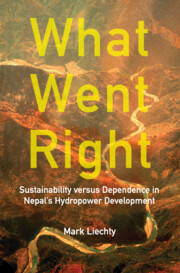Book contents
- Frontmatter
- Dedication
- Contents
- Preface
- Acknowledgments
- List of Abbreviations
- 1 A Corporate Vision: Business as Development Philosophy
- 2 The Butwal Technical Institute, Tinau, and the Origins of the Butwal Power Company
- 3 Andhi Khola
- 4 Jhimruk
- 5 The “Great Upheaval”: Khimti and the Limits of the Hoftun Hydropower Vision
- 6 Melamchi and the Rush to Privatization
- 7 Privatization: The Long Haul
- 8 The New BPC: Cultures in Conflict
- 9 Conclusion: From Seed, to Plant, to Seed
- Bibliography
- Index
- Miscellaneous Endmatter
6 - Melamchi and the Rush to Privatization
Published online by Cambridge University Press: 23 April 2022
- Frontmatter
- Dedication
- Contents
- Preface
- Acknowledgments
- List of Abbreviations
- 1 A Corporate Vision: Business as Development Philosophy
- 2 The Butwal Technical Institute, Tinau, and the Origins of the Butwal Power Company
- 3 Andhi Khola
- 4 Jhimruk
- 5 The “Great Upheaval”: Khimti and the Limits of the Hoftun Hydropower Vision
- 6 Melamchi and the Rush to Privatization
- 7 Privatization: The Long Haul
- 8 The New BPC: Cultures in Conflict
- 9 Conclusion: From Seed, to Plant, to Seed
- Bibliography
- Index
- Miscellaneous Endmatter
Summary
Odd Hoftun may have given up his official responsibilities in Nepal when, in 1994, he resigned his post as general manager of Himal Power Limited and retired to a tidy cottage in his wife's home village along the south coast of Norway. But “retirement” proved only to be the next phase of Hoftun's active career. Hoftun simply could not sit and watch the Butwal Power Company (BPC)—that he and so many others had nurtured for decades—sink into oblivion, especially after its nationalization in 1996. Once in government hands, it was as though BPC was placed on a shelf to be exploited occasionally but mainly ignored and allowed to disintegrate. For BPC simply to survive, let alone continue its growth curve along with its allied companies, it needed two things: new work and new management. It needed a new large-scale hydropower construction project to develop, and it needed to be brought under private ownership that would work to further its original mission of human capacity building in the interests of Nepal.
In what was to be the last major campaign of his career, Hoftun—along with others who shared his concerns—set out to accomplish these two goals. They would secure funding for the Melamchi Diversion Scheme (MDS) that would guarantee work for BPC, and they would spearhead a coalition of investors that would purchase BPC and allow them to again exert significant influence at the board level. Broadly speaking, both of these challenges were eventually met: today the Melamchi tunnel is almost completed, twenty-plus years after Hoftun's push, and BPC is a private company in Nepali hands. But neither of these efforts turned out as Hoftun hoped. BPC was eventually elbowed out of the Melamchi project by international contractors supported by so-called development banks. And the privatization process that Hoftun hoped would lead to Norwegian majority control of BPC eventually devolved into a nightmare of bureaucratic obstructionism that finally ended—six years after it began!—with a Nepali ownership whose priorities were often not Hoftun’s.
Once in “retirement”—but now no longer tied in any formal way to the United Mission to Nepal (UMN) and its priorities—Hoftun resumed his place at the chessboard of modern Nepali history attempting to outwit his opponents, channel momentum, and maneuver his pieces into positions of strength.
- Type
- Chapter
- Information
- What Went RightSustainability Versus Dependence in Nepal's Hydropower Development, pp. 148 - 193Publisher: Cambridge University PressPrint publication year: 2022



